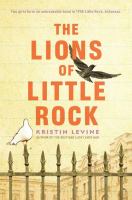
In Little Rock, Arkansas, in 1958, as politicians rage for and against the struggle to integrate schools, Marlee, 13, is a math whiz but she has a personal problem with mutism she's terrified to say things aloud in public. Then she makes friends and more importantly, talks with Lizzie, the new girl in her middle school, who encourages Marlee to even do an oral presentation in class together. Then one day Lizzie is thrown out of school. It turns out that she is a light-skinned black passing for white, and the locals refuse to follow the federal integration order. (Several kids and rabid adults use the n-word.) Marlee and Lizzie meet secretly, until it becomes too dangerous, with threatening phone calls and the KKK always around. Marlee discovers dynamite in a classmate's car, and yet still the police do nothing. Marlee's first-person narrative brings home the standoffs with classmates, family, and officials, but what is most moving is that while most do not change, some do. Readers who want more about the history can start with the long final note and bibliography.--Rochman, Hazel Copyright 2010 Booklist
Successfully weaving historical events with a dynamic personal narrative, Levine (The Best Bad Luck I Ever Had) offers a riveting, frequently tense portrait of 1958 Little Rock, Ark., the tumultuous year when the governor refused integration by closing local high schools. The story is told through the sensitive voice of painfully quiet 12-year-old Marlee Nisbett, who makes a rare friend in Liz, a new student at her middle school. Liz instills some much-needed confidence in Marlee, but when it's revealed that Liz is "passing" as a white student, Liz must leave school abruptly, putting their friendship to the test. The girls meet in secret, and Marlee joins an antisegregationist organization, both actions inviting serious risk amid escalating racist threats. Levine's characters fall on both sides of the integration issue, but she avoids painting them too broadly, and many of their views evolve over the course of the book. The best evolution, though, belongs to Marlee, who starts off almost pathologically shy and gradually learns to face her fears, find her voice, and speak up for what's right. Ages 10-up. Agent: Kathryn Green Literary Agency. (Jan.) (c) Copyright PWxyz, LLC. All rights reserved.
Gr 5-8-In this stunning piece of historical fiction, Levine sheds light on the little-known period immediately following the Little Rock Nine's integration of Central High School in 1957. In September 1958, Governor Orval Faubus ordered the closure of all public high schools in the city. This novel depicts the tumultuous era through the eyes of 12-year-old Marlee Nisbett, who is painfully shy but eventually reclaims her voice by having the courage to do the right thing. On her first day at West Side Junior High, Marlee meets Liz, a new girl unafraid of speaking her mind. Emboldened by her friendship with Liz, Marlee begins talking and interacting more with her classmates. When Liz abruptly disappears amid rumors that she is a black girl-"Can you believe it..A nigger at our school?"-passing for white, Marlee is bereft but determined to uphold the friendship, at great cost to both girls' safety. In trying to sustain her relationship with Liz, Marlee ultimately realizes that there is a bigger cause at stake. With remarkable depth and clarity, Levine unflinchingly portrays racial tensions in the 1950s Deep South. Her descriptions of the Women's Emergency Committee to Open Our Schools (WEC) and the Stop This Outrageous Purge (STOP) campaign further lend an air of historical authenticity to the book. Readers will be moved by Marlee and Liz's strong bonds and inspired by Marlee's unwavering tenacity in the face of what seems like insurmountable adversity.-Lalitha Nataraj, Escondido Public Library, CA (c) Copyright 2012. Library Journals LLC, a wholly owned subsidiary of Media Source, Inc. No redistribution permitted.


